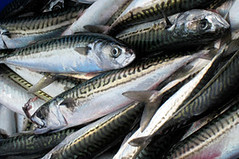
PREV ARTICLE
NEXT ARTICLE
FULL ISSUE
PREV FULL ISSUE
V11 2008 INDEX
E-SYLUM ARCHIVE
HOLY MACKEREL! WITHOUT SMOKES, PRISONERS TURN TO FISH AS MEDIUM OF EXCHANGE
In recent weeks the MPCGram, a newsletter for collectors of
military payment certificates and other military money, discussed the use
of cigarettes as money in prison camps. Thursday's Wall Street Journal
reported a modern twist on the economics of incarceration - prisoners in a
California lockup have taken to using dried fish as a medium of exchange.
-Editor
 When Larry Levine helped prepare divorce papers
for a client a few years ago, he got paid in mackerel. Once the case
ended, he says, "I had a stack of macks."
When Larry Levine helped prepare divorce papers
for a client a few years ago, he got paid in mackerel. Once the case
ended, he says, "I had a stack of macks."Mr. Levine and his client were prisoners in California's Lompoc Federal Correctional Complex. Like other federal inmates around the country, they found a can of mackerel -- the "mack" in prison lingo -- was the standard currency.
"It's the coin of the realm," says Mark Bailey, who paid Mr. Levine in fish.
"It's the coin of the realm," says Mark Bailey, who paid Mr. Levine in fish. Mr. Bailey was serving a two-year tax-fraud sentence in connection with a chain of strip clubs he owned. Mr. Levine was serving a nine-year term for drug dealing. Mr. Levine says he used his macks to get his beard trimmed, his clothes pressed and his shoes shined by other prisoners. "A haircut is two macks," he says, as an expected tip for inmates who work in the prison barber shop.
There's been a mackerel economy in federal prisons since about 2004, former inmates and some prison consultants say. That's when federal prisons prohibited smoking and, by default, the cigarette pack, which was the earlier gold standard.
Prisoners need a proxy for the dollar because they're not allowed to possess cash. Money they get from prison jobs (which pay a maximum of 40 cents an hour, according to the Federal Bureau of Prisons) or family members goes into commissary accounts that let them buy things such as food and toiletries. After the smokes disappeared, inmates turned to other items on the commissary menu to use as currency.
Books of stamps were one easy alternative. "It was like half a book for a piece of fruit," says Tony Serra, a well-known San Francisco criminal-defense attorney who last year finished nine months in Lompoc on tax charges. Elsewhere in the West, prisoners use PowerBars or cans of tuna, says Ed Bales, a consultant who advises people who are headed to prison. But in much of the federal prison system, he says, mackerel has become the currency of choice.
Mackerel supplier Global Source Marketing Inc. says demand from prisons has grown since 2004. In recent years, demand has switched from cans -- which wardens don't like because inmates can turn them into makeshift knives -- to plastic-and-foil pouches of mackerel fillets, says Jon Linder, a vice president at supplier Power Commissary Inc., in Bohemia, N.Y.
Mackerel is hot in prisons in the U.S., but not so much anywhere else, says Mark Muntz, president of Global Source, which imports fillets of the oily, dark-fleshed fish from Asian canneries.
To read the complete article, see: Mackerel Economics in Prison Leads to Appreciation for Oily Fillets (http://online.wsj.com/article/SB122290720439096481.html)
Wayne Homren, Editor
The Numismatic Bibliomania Society is a non-profit organization promoting numismatic literature. See our web site at coinbooks.org.
To submit items for publication in The E-Sylum, write to the Editor at this address: whomren@gmail.com
To subscribe go to: https://my.binhost.com/lists/listinfo/esylum
All Rights Reserved.
NBS Home Page
Contact the NBS webmaster
